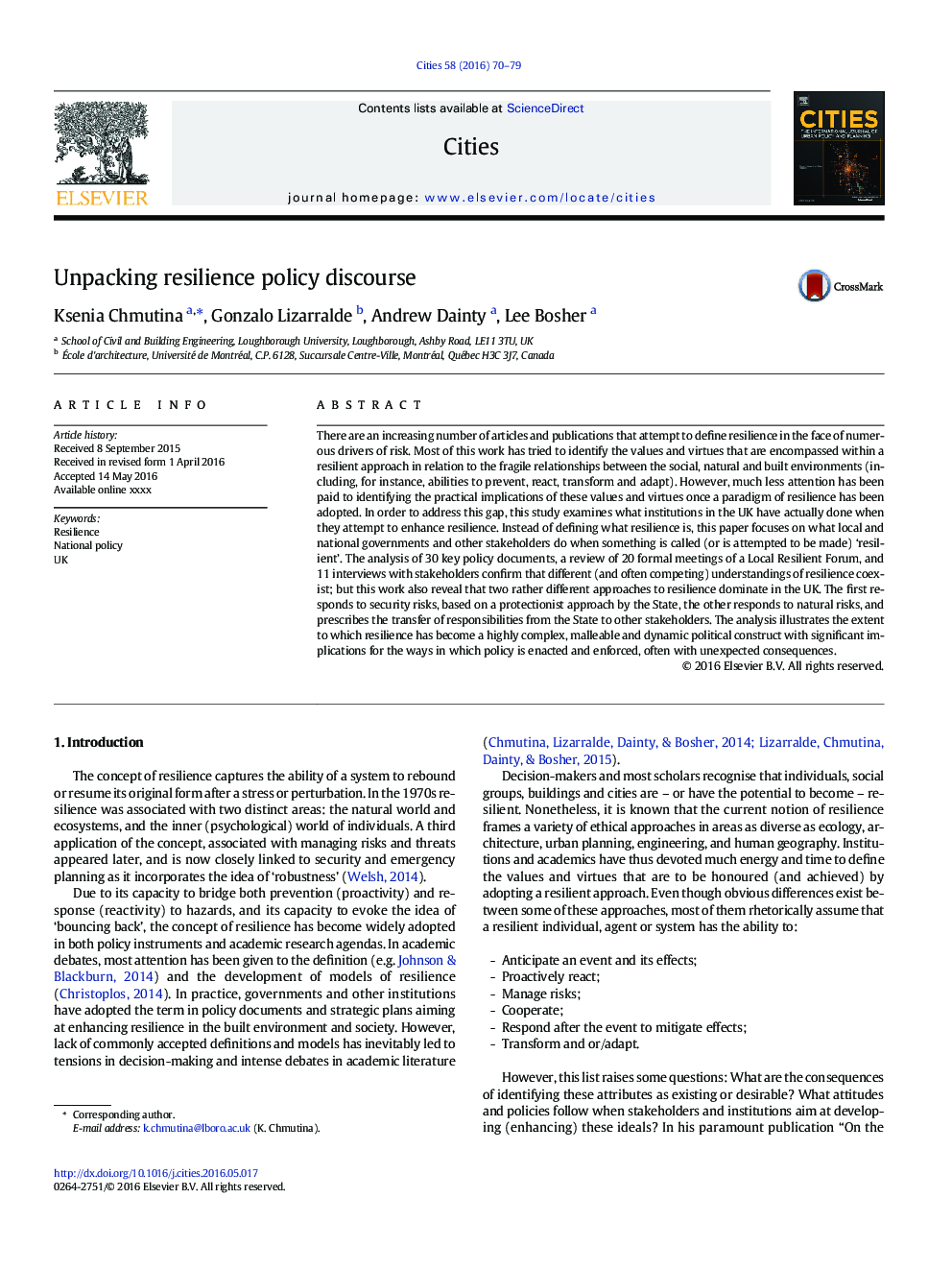| کد مقاله | کد نشریه | سال انتشار | مقاله انگلیسی | نسخه تمام متن |
|---|---|---|---|---|
| 7417939 | 1482338 | 2016 | 10 صفحه PDF | دانلود رایگان |
عنوان انگلیسی مقاله ISI
Unpacking resilience policy discourse
ترجمه فارسی عنوان
کشف گفتمان سیاست انعطاف پذیری
دانلود مقاله + سفارش ترجمه
دانلود مقاله ISI انگلیسی
رایگان برای ایرانیان
کلمات کلیدی
انعطاف پذیری، سیاست ملی، انگلستان،
ترجمه چکیده
تعداد روزافزونی از مقالات و نشریات که تلاش برای تعریف مقاومت در برابر رانندگان متعدد ریسک وجود دارد. بیشتر این کار تلاش کرده است ارزش ها و فضایل را که در یک رویکرد انعطاف پذیر در ارتباط با روابط شکننده بین محیط های اجتماعی، طبیعی و ساخته شده (از جمله، توانایی هایی برای جلوگیری، واکنش، تبدیل و سازگاری) ایجاد شده، شناسایی کند. با این حال، به منظور شناسایی مفاهیم عملی این ارزشها و فضایل، هنگامی که یک پارادایم انعطاف پذیری به تصویب رسید، کمتر توجه شده است. به منظور رفع این شکاف، این مطالعه به بررسی آنچه که نهادهای در انگلستان انجام می دهند زمانی که آنها تلاش برای افزایش انعطاف پذیری. در عوض تعریف چیزی که انعطاف پذیری است، این مقاله بر آن است که چه موقعی (یا سعی می شود ساخته شود) "انعطاف پذیر" نامیده شود. تجزیه و تحلیل 30 اسناد کلیدی سیاست، بازبینی 20 جلسه رسمی یک مجمع انعطاف پذیر محلی و 11 مصاحبه با ذینفعان، تأیید می کنند که درک های متفاوت (و اغلب رقابتی) انعطاف پذیری همگام هستند؛ اما این کار همچنین نشان می دهد که دو روش نسبتا متفاوت برای انعطاف پذیری در انگلستان حاکم است. اولین پاسخ به خطرات امنیتی، بر اساس رویکرد محافظتی گری توسط دولت، دیگر به خطرات طبیعی واکنش نشان می دهد و انتقال مسئولیت ها از سوی دولت به سایر سهامداران را بیان می کند. تجزیه و تحلیل نشان می دهد که میزان انعطاف پذیری به یک ساختار سیاسی بسیار پیچیده، قابل تغییر و پویا تبدیل شده است که پیامدهای مهمی برای راه هایی که در آن سیاست ها اعمال شده و اجرا می شود، اغلب با عواقب غیر منتظره.
موضوعات مرتبط
علوم انسانی و اجتماعی
مدیریت، کسب و کار و حسابداری
گردشگری، اوقات فراغت و مدیریت هتلداری
چکیده انگلیسی
There are an increasing number of articles and publications that attempt to define resilience in the face of numerous drivers of risk. Most of this work has tried to identify the values and virtues that are encompassed within a resilient approach in relation to the fragile relationships between the social, natural and built environments (including, for instance, abilities to prevent, react, transform and adapt). However, much less attention has been paid to identifying the practical implications of these values and virtues once a paradigm of resilience has been adopted. In order to address this gap, this study examines what institutions in the UK have actually done when they attempt to enhance resilience. Instead of defining what resilience is, this paper focuses on what local and national governments and other stakeholders do when something is called (or is attempted to be made) 'resilient'. The analysis of 30 key policy documents, a review of 20 formal meetings of a Local Resilient Forum, and 11 interviews with stakeholders confirm that different (and often competing) understandings of resilience coexist; but this work also reveal that two rather different approaches to resilience dominate in the UK. The first responds to security risks, based on a protectionist approach by the State, the other responds to natural risks, and prescribes the transfer of responsibilities from the State to other stakeholders. The analysis illustrates the extent to which resilience has become a highly complex, malleable and dynamic political construct with significant implications for the ways in which policy is enacted and enforced, often with unexpected consequences.
ناشر
Database: Elsevier - ScienceDirect (ساینس دایرکت)
Journal: Cities - Volume 58, October 2016, Pages 70-79
Journal: Cities - Volume 58, October 2016, Pages 70-79
نویسندگان
Ksenia Chmutina, Gonzalo Lizarralde, Andrew Dainty, Lee Bosher,
